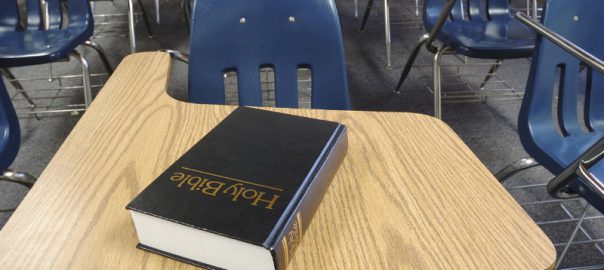Let’s look at where the federal standards are supposed to be according to the courts first. This should give a basic understanding what is and isn’t allowed.
Freedom of religion is not the same as freedom from religion; this is a common fallacy perpetrated in many school systems. This comes from the purposeful misinterpretation of the phrase “separation of church and state” and its historical development; these words are not part of the U.S. Constitution. The correct interpretation is the “establishment of religion” clause. Public schools, just like government, are supposed to be neutral in regards to religion; they are not supposed to be too friendly or too aggressive.
Furthermore, it is generally accepted that public schools are not to allow the use of religious texts for the purposes of proselytizing; this would make those public schools into miniature churches, temples, or synagogues. This was one of the reasons the morning Bible reading from the teacher or principal in a public school was banned. The Bible and student reading of the Bible were not banned, but using a public authority figure to unilaterally impose a particular point of view with religious connotations was. This is the point of the “establishment of religion” clause. In fact, the U.S. Supreme Court case that banned “Bible reading in the schools” (the Schempp decision) also made mention that a comparative religion class should be the capstone of a good college education!
To take out the Bible, or any other religious text or lore, especially when studying history, philosophy, foreign affairs, or anthropology would gut those subjects. It would not matter if you have Judeo-Christian beliefs or not. It would effectively make the crusades and many European wars the equivalent of the blue team fought with the orange team.
In American history, it would make meaningless why we had different colonies. The founding colonies had compacts from different religious groups. Their values, views, and practices were different from colony to colony. In other words, we are taking out a part of the motivation, or the why, something occurs in a particular way. One reason for the emphasis on the Bible in the United States of America is the founding of the nation is historically Judeo-Christian based. The Old Testament is the basis of the Jewish religion. This analysis was provided in the S1342 bill and in public testimony.
With President Obama making comments like “people clinging to their Bibles and guns” and the Department of Education unilaterally rewriting the Title IX implementation rules via the April 4, 2011 “Dear Colleague” letter, Christianity has been purposefully targeted aggressively.
The exact wording for S1342 allowed for any religious book to be used, but the inclusion of the specific word “Bible” was what caught people’s attention. There is some political correctness that believes it is okay to attack Christianity. Luckily in Idaho, we have some very decent Democrats in the Senate that saw beyond this. Furthermore, it is the student with parental consent that determines if the Bible is used. This bill allowed the Bible to be on school premises; it doesn’t mean the school is using it for proselytizing like some public figures tried to insinuate.
Our poor Governor Otter fell into the trap the U.S. Supreme Court during the Schempp decision warned was coming; this was the religion of secularism. If it involves religion, he has to treat it like a vampire reacting to sunlight. I hope Governor Otter’s case does not get as bad as President Obama’s past demonstrations. When President Obama visited Notre Dame, he had many of the crucifixes covered up for his visit.
For Governor Butch Otter, the Bible banner, he just censored one of the major inspirations for our form of government, a path of compassion and understanding in our legal system and personal lives, and a sample listing of consequences when we decide to adopt amoral paths. It isn’t God’s forgiveness when Butch says Lord’s Prayer that concerns me. It will be Butch’s forgiveness of himself when he comes to the true realization of what he has done.


